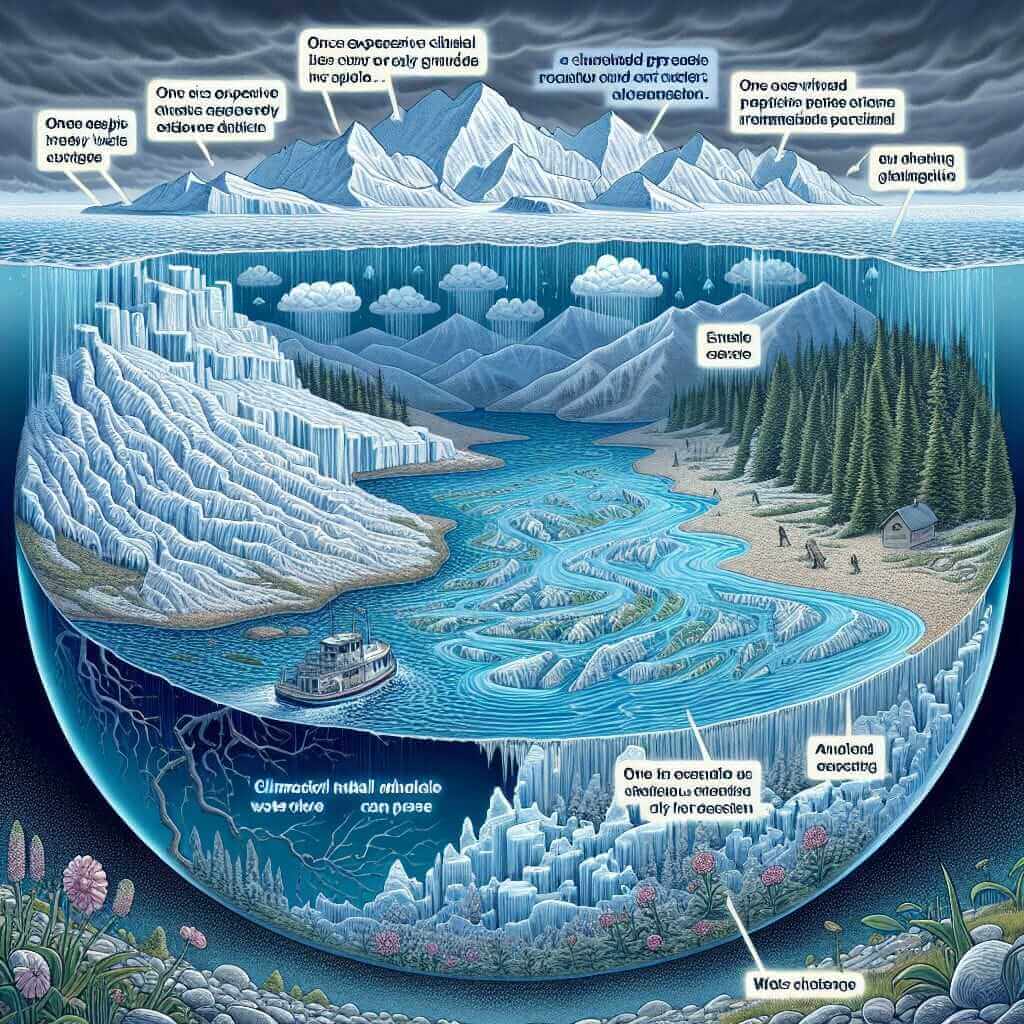The Reading section of the IELTS test is designed to assess various skills, such as reading for gist, reading for main ideas, reading for detail, skimming, understanding logical argument, and recognizing writers’ opinions, attitudes, and purpose. Climate change and its effects on different aspects of the environment are common topics due to their relevance and urgency. Recent analyses suggest that the topic “What are the impacts of climate change on global water supplies?” has appeared several times, indicating its importance in the worldly context and likelihood of appearing again in future exams.
In this article, we will provide you with a comprehensive reading exercise designed to simulate an actual IELTS Reading test. We will begin with a passage focused on the impacts of climate change on global water supplies, followed by various question types typical of the IELTS exam. Finally, you will find an answer key, explanations, vocabulary highlights, and grammar points to help you better understand and prepare.
Reading Passage
Climate Change and Its Impacts on Global Water Supplies
Climate change is recognized as one of the most critical challenges of our time, significantly impacting global water supplies. The planet’s rising temperatures influence the availability, quality, and distribution of water resources around the world.

Melting Glaciers and Ice Sheets
One of the most noticeable effects of climate change is the accelerated melting of glaciers and ice sheets. These natural reservoirs of fresh water are diminishing at alarming rates, contributing to rising sea levels and reducing the availability of freshwater for human consumption, agriculture, and hydroelectric power.
Altered Precipitation Patterns
Climate change alters precipitation patterns, leading to shifts in rainy and dry seasons. Such changes result in unpredictable water availability, with some regions experiencing severe droughts while others face an increase in extreme rainfall events. This unpredictability complicates flood management and water storage strategies.
Increased Frequency of Extreme Weather Events
The frequency and intensity of extreme weather events, such as hurricanes, typhoons, and heatwaves, are also increasing. These events can cause considerable damage to water infrastructure, contaminating water supplies and disrupting water distribution systems.
Impacts on Water Quality
Rising temperatures and changes in precipitation patterns affect water quality. Warmer temperatures can lead to the proliferation of harmful algae blooms in freshwater bodies, making the water unsafe for aquatic life and human use. Additionally, intense rainfall can lead to the runoff of pollutants into rivers and lakes, further degrading water quality.
Regional Disparities
The impacts of climate change on water supplies are not uniform. Some regions are more vulnerable due to their geographical location, economic constraints, and existing water scarcity issues. For instance, arid and semi-arid areas are likely to face exacerbated water scarcity, while certain island nations may struggle with saline intrusion into freshwater aquifers.
Questions
Multiple Choice
- According to the passage, what are the consequences of melting glaciers?
A. Decrease in hydroelectric power
B. Increase in sea levels
C. Both A and B
D. Neither A nor B
True/False/Not Given
- Climate change has led to an increase in droughts in all regions of the world.
A) True
B) False
C) Not Given
Matching Headings
- Match the correct heading to each section of the passage.
- Melting Glaciers and Ice Sheets
- Altered Precipitation Patterns
- Increased Frequency of Extreme Weather Events
- Impacts on Water Quality
- Regional Disparities
Summary Completion
- Complete the summary using words from the passage.
Climate change significantly impacts global water supplies, affecting the (i) , (ii) , and (iii) of water resources. The melting of (iv) leads to rising sea levels and reduced freshwater availability. Altered precipitation patterns cause unpredictable water availability, contributing to severe (v) and increased (vi) events.
Answer Key
Multiple Choice
- C. Both A and B
True/False/Not Given
- B) False
Matching Headings
- Melting Glaciers and Ice Sheets – Paragraph 2
- Altered Precipitation Patterns – Paragraph 3
- Increased Frequency of Extreme Weather Events – Paragraph 4
- Impacts on Water Quality – Paragraph 5
- Regional Disparities – Paragraph 6
Summary Completion
- (i) availability, (ii) quality, (iii) distribution, (iv) glaciers and ice sheets, (v) droughts, (vi) extreme rainfall
Common Mistakes and Tips
Common Mistakes
- Misinterpreting the True/False/Not Given questions by assuming information not provided in the passage.
- Matching incorrect headings due to misunderstanding the main idea of the paragraphs.
Vocabulary Highlights
- Reservoir (noun) /ˈrezərˌvwär/: A large natural or artificial lake used as a source of water supply.
- Algae bloom (noun) /ˈælʤi blum/: A rapid increase in the population of algae in a water system, often resulting in pollution.
- Scarcity (noun) /ˈskersi:ti/: The state of being in short supply; shortage.
Grammar Points
- Complex sentences using connectors such as “while” and “although” for contrasting ideas.
- Example: “While some regions face severe droughts, others are experiencing increased rainfall events.”
- Use of passive voice to focus on the action rather than the subject.
- Example: “The availability of freshwater for human consumption is being reduced.”
Conclusion
By practicing reading passages and questions on relevant contemporary topics like climate change and its impact on global water supplies, you can improve your comprehension skills for the IELTS Reading test. Remember to focus on understanding the main ideas, details, and the author’s intent in the passages. Regular practice and review of vocabulary and grammar will further boost your confidence and performance in the exam.